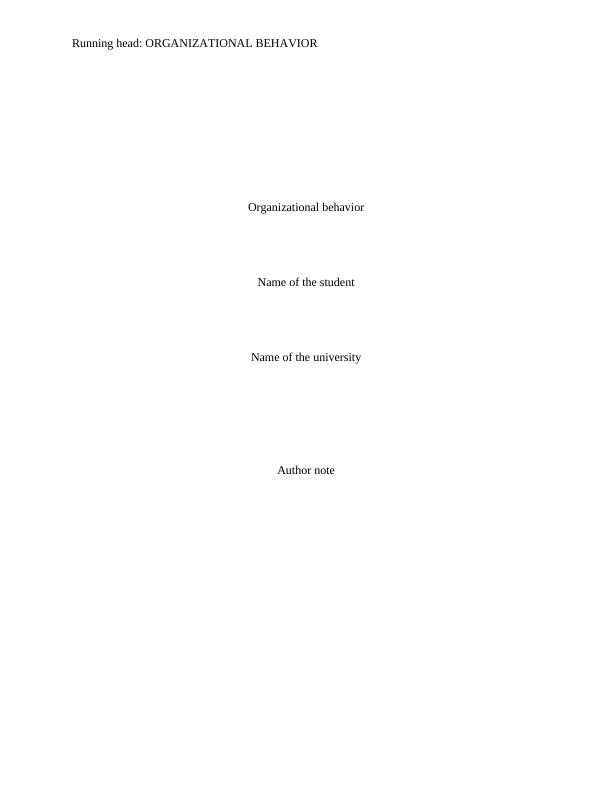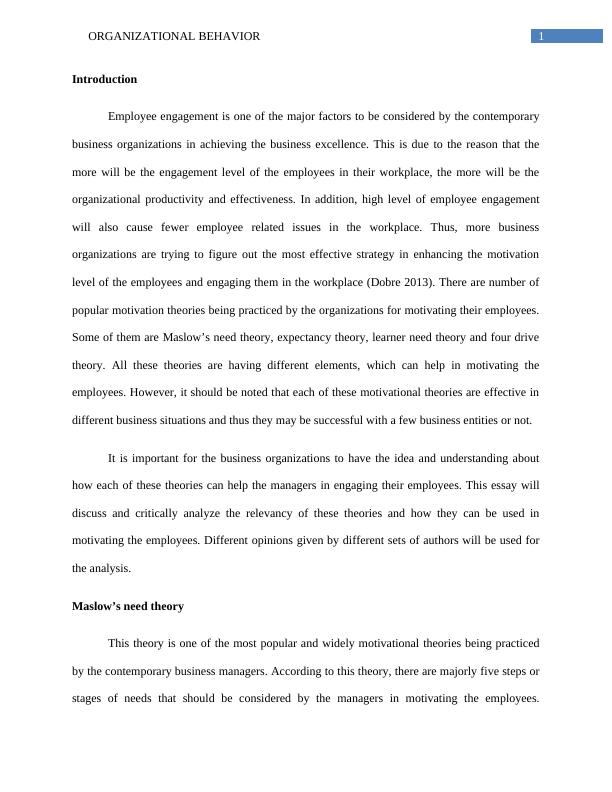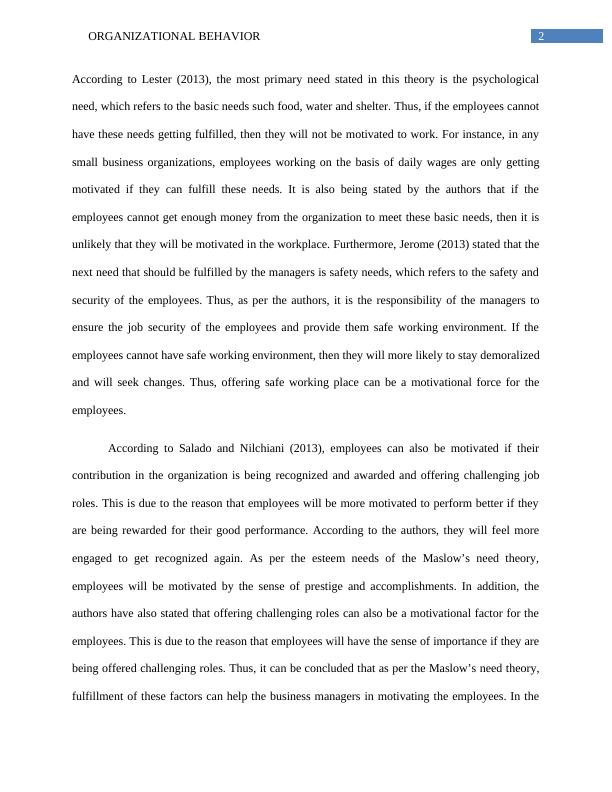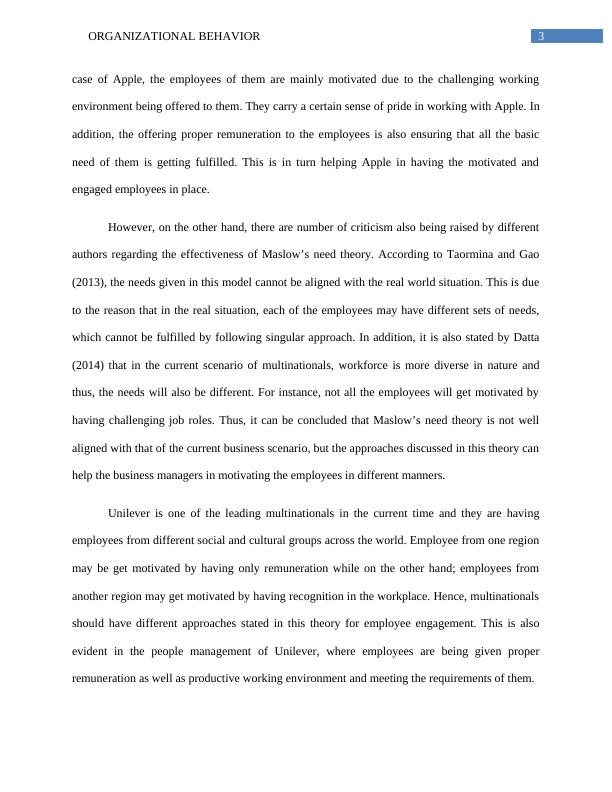Motivational Theories and Employee Engagement
Added on 2023-04-19
14 Pages4082 Words266 Views
Running head: ORGANIZATIONAL BEHAVIOR
Organizational behavior
Name of the student
Name of the university
Author note
Organizational behavior
Name of the student
Name of the university
Author note

1ORGANIZATIONAL BEHAVIOR
Introduction
Employee engagement is one of the major factors to be considered by the contemporary
business organizations in achieving the business excellence. This is due to the reason that the
more will be the engagement level of the employees in their workplace, the more will be the
organizational productivity and effectiveness. In addition, high level of employee engagement
will also cause fewer employee related issues in the workplace. Thus, more business
organizations are trying to figure out the most effective strategy in enhancing the motivation
level of the employees and engaging them in the workplace (Dobre 2013). There are number of
popular motivation theories being practiced by the organizations for motivating their employees.
Some of them are Maslow’s need theory, expectancy theory, learner need theory and four drive
theory. All these theories are having different elements, which can help in motivating the
employees. However, it should be noted that each of these motivational theories are effective in
different business situations and thus they may be successful with a few business entities or not.
It is important for the business organizations to have the idea and understanding about
how each of these theories can help the managers in engaging their employees. This essay will
discuss and critically analyze the relevancy of these theories and how they can be used in
motivating the employees. Different opinions given by different sets of authors will be used for
the analysis.
Maslow’s need theory
This theory is one of the most popular and widely motivational theories being practiced
by the contemporary business managers. According to this theory, there are majorly five steps or
stages of needs that should be considered by the managers in motivating the employees.
Introduction
Employee engagement is one of the major factors to be considered by the contemporary
business organizations in achieving the business excellence. This is due to the reason that the
more will be the engagement level of the employees in their workplace, the more will be the
organizational productivity and effectiveness. In addition, high level of employee engagement
will also cause fewer employee related issues in the workplace. Thus, more business
organizations are trying to figure out the most effective strategy in enhancing the motivation
level of the employees and engaging them in the workplace (Dobre 2013). There are number of
popular motivation theories being practiced by the organizations for motivating their employees.
Some of them are Maslow’s need theory, expectancy theory, learner need theory and four drive
theory. All these theories are having different elements, which can help in motivating the
employees. However, it should be noted that each of these motivational theories are effective in
different business situations and thus they may be successful with a few business entities or not.
It is important for the business organizations to have the idea and understanding about
how each of these theories can help the managers in engaging their employees. This essay will
discuss and critically analyze the relevancy of these theories and how they can be used in
motivating the employees. Different opinions given by different sets of authors will be used for
the analysis.
Maslow’s need theory
This theory is one of the most popular and widely motivational theories being practiced
by the contemporary business managers. According to this theory, there are majorly five steps or
stages of needs that should be considered by the managers in motivating the employees.

2ORGANIZATIONAL BEHAVIOR
According to Lester (2013), the most primary need stated in this theory is the psychological
need, which refers to the basic needs such food, water and shelter. Thus, if the employees cannot
have these needs getting fulfilled, then they will not be motivated to work. For instance, in any
small business organizations, employees working on the basis of daily wages are only getting
motivated if they can fulfill these needs. It is also being stated by the authors that if the
employees cannot get enough money from the organization to meet these basic needs, then it is
unlikely that they will be motivated in the workplace. Furthermore, Jerome (2013) stated that the
next need that should be fulfilled by the managers is safety needs, which refers to the safety and
security of the employees. Thus, as per the authors, it is the responsibility of the managers to
ensure the job security of the employees and provide them safe working environment. If the
employees cannot have safe working environment, then they will more likely to stay demoralized
and will seek changes. Thus, offering safe working place can be a motivational force for the
employees.
According to Salado and Nilchiani (2013), employees can also be motivated if their
contribution in the organization is being recognized and awarded and offering challenging job
roles. This is due to the reason that employees will be more motivated to perform better if they
are being rewarded for their good performance. According to the authors, they will feel more
engaged to get recognized again. As per the esteem needs of the Maslow’s need theory,
employees will be motivated by the sense of prestige and accomplishments. In addition, the
authors have also stated that offering challenging roles can also be a motivational factor for the
employees. This is due to the reason that employees will have the sense of importance if they are
being offered challenging roles. Thus, it can be concluded that as per the Maslow’s need theory,
fulfillment of these factors can help the business managers in motivating the employees. In the
According to Lester (2013), the most primary need stated in this theory is the psychological
need, which refers to the basic needs such food, water and shelter. Thus, if the employees cannot
have these needs getting fulfilled, then they will not be motivated to work. For instance, in any
small business organizations, employees working on the basis of daily wages are only getting
motivated if they can fulfill these needs. It is also being stated by the authors that if the
employees cannot get enough money from the organization to meet these basic needs, then it is
unlikely that they will be motivated in the workplace. Furthermore, Jerome (2013) stated that the
next need that should be fulfilled by the managers is safety needs, which refers to the safety and
security of the employees. Thus, as per the authors, it is the responsibility of the managers to
ensure the job security of the employees and provide them safe working environment. If the
employees cannot have safe working environment, then they will more likely to stay demoralized
and will seek changes. Thus, offering safe working place can be a motivational force for the
employees.
According to Salado and Nilchiani (2013), employees can also be motivated if their
contribution in the organization is being recognized and awarded and offering challenging job
roles. This is due to the reason that employees will be more motivated to perform better if they
are being rewarded for their good performance. According to the authors, they will feel more
engaged to get recognized again. As per the esteem needs of the Maslow’s need theory,
employees will be motivated by the sense of prestige and accomplishments. In addition, the
authors have also stated that offering challenging roles can also be a motivational factor for the
employees. This is due to the reason that employees will have the sense of importance if they are
being offered challenging roles. Thus, it can be concluded that as per the Maslow’s need theory,
fulfillment of these factors can help the business managers in motivating the employees. In the

3ORGANIZATIONAL BEHAVIOR
case of Apple, the employees of them are mainly motivated due to the challenging working
environment being offered to them. They carry a certain sense of pride in working with Apple. In
addition, the offering proper remuneration to the employees is also ensuring that all the basic
need of them is getting fulfilled. This is in turn helping Apple in having the motivated and
engaged employees in place.
However, on the other hand, there are number of criticism also being raised by different
authors regarding the effectiveness of Maslow’s need theory. According to Taormina and Gao
(2013), the needs given in this model cannot be aligned with the real world situation. This is due
to the reason that in the real situation, each of the employees may have different sets of needs,
which cannot be fulfilled by following singular approach. In addition, it is also stated by Datta
(2014) that in the current scenario of multinationals, workforce is more diverse in nature and
thus, the needs will also be different. For instance, not all the employees will get motivated by
having challenging job roles. Thus, it can be concluded that Maslow’s need theory is not well
aligned with that of the current business scenario, but the approaches discussed in this theory can
help the business managers in motivating the employees in different manners.
Unilever is one of the leading multinationals in the current time and they are having
employees from different social and cultural groups across the world. Employee from one region
may be get motivated by having only remuneration while on the other hand; employees from
another region may get motivated by having recognition in the workplace. Hence, multinationals
should have different approaches stated in this theory for employee engagement. This is also
evident in the people management of Unilever, where employees are being given proper
remuneration as well as productive working environment and meeting the requirements of them.
case of Apple, the employees of them are mainly motivated due to the challenging working
environment being offered to them. They carry a certain sense of pride in working with Apple. In
addition, the offering proper remuneration to the employees is also ensuring that all the basic
need of them is getting fulfilled. This is in turn helping Apple in having the motivated and
engaged employees in place.
However, on the other hand, there are number of criticism also being raised by different
authors regarding the effectiveness of Maslow’s need theory. According to Taormina and Gao
(2013), the needs given in this model cannot be aligned with the real world situation. This is due
to the reason that in the real situation, each of the employees may have different sets of needs,
which cannot be fulfilled by following singular approach. In addition, it is also stated by Datta
(2014) that in the current scenario of multinationals, workforce is more diverse in nature and
thus, the needs will also be different. For instance, not all the employees will get motivated by
having challenging job roles. Thus, it can be concluded that Maslow’s need theory is not well
aligned with that of the current business scenario, but the approaches discussed in this theory can
help the business managers in motivating the employees in different manners.
Unilever is one of the leading multinationals in the current time and they are having
employees from different social and cultural groups across the world. Employee from one region
may be get motivated by having only remuneration while on the other hand; employees from
another region may get motivated by having recognition in the workplace. Hence, multinationals
should have different approaches stated in this theory for employee engagement. This is also
evident in the people management of Unilever, where employees are being given proper
remuneration as well as productive working environment and meeting the requirements of them.

End of preview
Want to access all the pages? Upload your documents or become a member.
Related Documents
Organizational behavior and managementlg...
|7
|1695
|38
Introduction to Organizational Behavior pdflg...
|4
|746
|37
Leadership and change management:Assignmentlg...
|14
|3653
|762
Key motivational theories in increasing employee engagementlg...
|11
|3260
|331
Leadership Styles and Motivation Theories in Organizational Behaviorlg...
|13
|2899
|378
Organizational Behavior: Responsibilities of Management in Employee Motivationlg...
|12
|2900
|343
